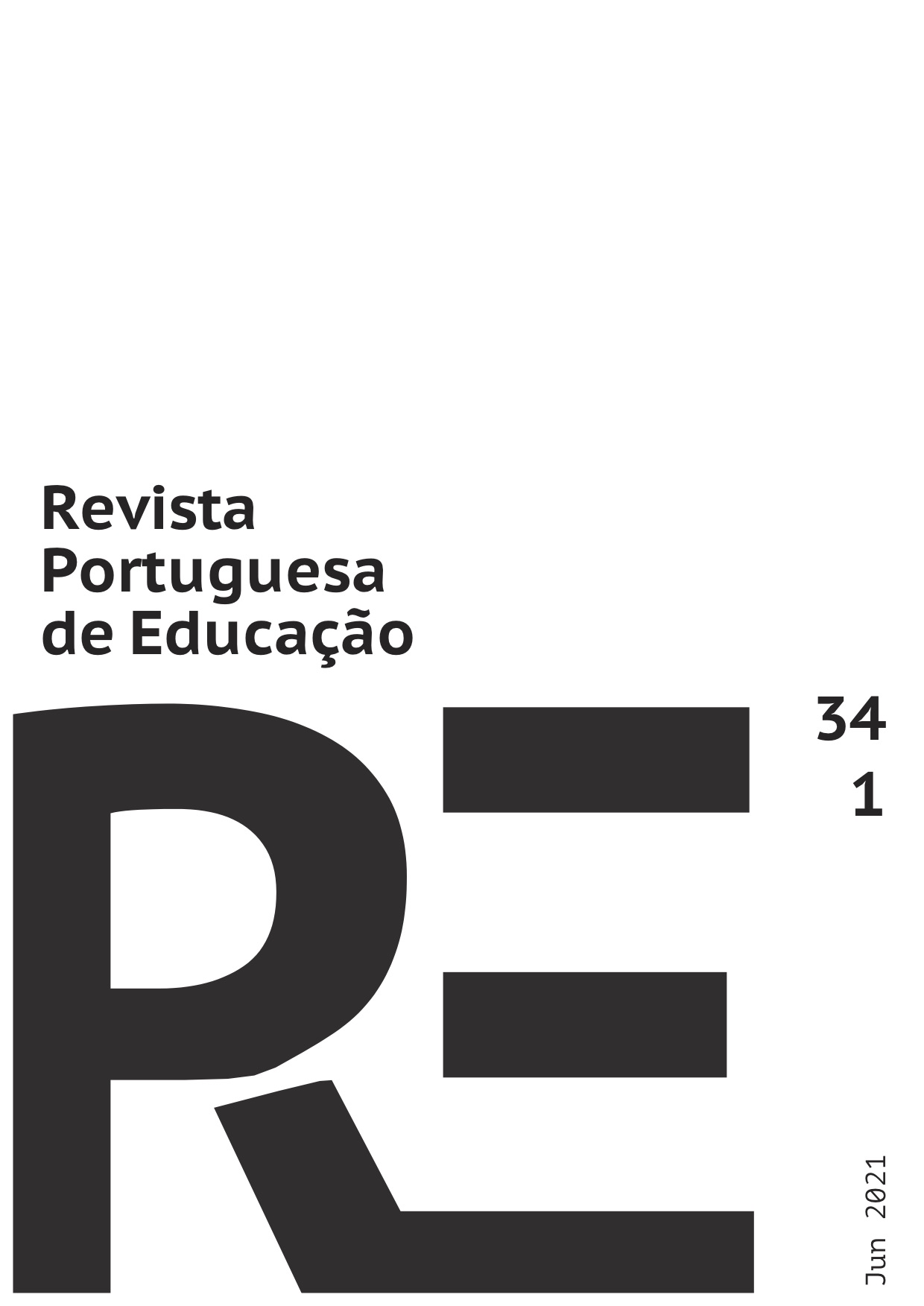Ensinar em tempos de COVID-19: um estudo com professores dos ensinos básico e secundário em Portugal
DOI:
https://doi.org/10.21814/rpe.21108Palavras-chave:
Ensino, Avaliação, COVID-19, Professores do ensino básico e secundárioResumo
O presente estudo visou compreender o modo como os professores portugueses se adaptaram aos contextos de ensino à distância face à pandemia da COVID-19. Do ponto de vista metodológico, realizou-se um estudo quantitativo, de natureza extensiva, com o recurso a um inquérito por questionário online, ao qual responderam 2369 professores de todos os níveis de ensino. Os resultados obtidos mostram que os participantes tiveram que lidar com um conjunto complexo de dificuldades relacionado com o trânsito abrupto para um “ensino remoto de emergência”, o que implicou a criação de condições de acesso aos alunos, à reorganização da escola e do trabalho docente, à adaptação do processo de ensino e aprendizagem e ao domínio de diversas plataformas e ferramentas para interagir com os alunos. Embora prevaleça uma perceção positiva da capacidade das escolas e dos professores, sobretudo na valorização de recursos endógenos e da colegialidade, ressaltam os efeitos de sobrecarga de trabalho, stress, ansiedade e esgotamento, bem como a incapacidade de garantir uma resposta universal e inclusiva.
Downloads
Referências
Avalos, B. & Flores, M. A. (2021). School-based teacher collaboration in Chile and Portugal, Compare: A Journal of Comparative and International Education, https://doi.org/10.1080/03057925.2020.1854085.
Bao, W. (2020). COVID-19 and online teaching in higher education: A case study of Peking University. Human Behavior & Emerging Technologies, 2(2), 113–115. https://doi.org/10.1002/hbe2.191.
Barras, H. (2020). Évaluer dans l’urgence, en repensant sa planification à l’aide des principes issus de la gestion de crises. Évaluer. Journal international de recherche en éducation et formation. Numéro Hors-série, 1, 17-14.
Bozkurt, A. & Sharma, R. C. (2020). Emergency remote teaching in a time of global crisis due to CoronaVirus pandemic. Asian Journal of Distance Education, 15(1), i-vi.
Bubb, S. & Jones, M. A. (2020). Learning from the COVID-19 home-schooling experience: Listening to pupils, parents/carers and teachers, Improving Schools 2020, 23(3) 209–222.
Detroz, P, Tessaro, W. & Younès N. (2020). Évaluer en temps de pandémie. Évaluer. Journal international de recherche en éducation et formation, Numéro Hors-série, 1, 1-3.
Education International (2020). Guiding principles on the COVID-19 pandemic, https://www.ei-ie.org/en/detail/16701/guiding-principles-on-the-covid-19-pandemic.
Esteves, M. (2006). Análise de Conteúdo. In L. Lima & J. A. Pacheco (Eds.), Fazer Investigação. Contributos para a elaboração de dissertação e teses (pp. 105-126). Porto Editora.
Evetts, J. (2009). The management of professionalism: a contemporary paradox. In S. Gewirtz, P. Mahony, I. Hextall, & A. Cribb (Eds.) Changing Teacher Professionalism. International trends, challenges and ways forward (pp. 19-30). Routledge.
Ferdig, R.E., Baumgartner, E., Hartshorne, R., Kaplan-Rakowski, R. & Mouza, C. (Eds). (2020). Teaching, Technology, and Teacher Education During the COVID-19 Pandemic: Stories from the Field. Association for the Advancement of Computing in Education (AACE). https://www.learntechlib.org/p/216903/.
Flores, M. A. & Gago, M. (2020) Teacher education in times of COVID-19 pandemic in Portugal: national, institutional and pedagogical responses, Journal of Education for Teaching, 46(4), 507-516.
Huber, S. G. & Helm, C. (2020). COVID-19 and schooling: evaluation, assessment and accountability in times of crises—reacting quickly to explore key issues for policy, practice and research with the school barometer. Educational Assessment, Evaluation and Accountability, 32, 237–270.
Joyce, B. R., Weil, M. & Calhoun, E. (2004). Models of teaching (7.ª edição). Allyn and Bacon.
Judd, J., Rember, B. A., Pellegrini, T., Ludlow, B. & Meisner, J. (2020). This is Not Teaching”: The Effects of COVID-19 on Teachers. https://www.socialpublishersfoundation.org/knowledge_base/this-is-not-teaching-the-effects-of-covid-19-on-teachers/.
König, J., Jäger-Biela, D. J. & Glutsch, N. (2020). Adapting to online teaching during COVID-19 school closure: Teacher education and teacher competence effects among early career teachers in Germany. European Journal of Teacher Education, 43(4), 608–622. https://doi.org/10.1080/02619768.2020.1809650.
Moorhouse, B. L. (2020). Adaptations to a face-to-face initial teacher education course ‘forced’ online due to the COVID-19 pandemic. Journal of Education for Teaching, 0(0), 1–3. https://doi.org/10.1080/02607476.2020.1755205.
NFER (2020). Schools’ Responses to Covid-19. Pupil engagement in remote learning. https://www.nfer.ac.uk/schools-responses-to-covid-19-pupil-engagement-in-remote-learning/.
Sachs, J. (2016). Teacher professionalism: why are we still talking about it? Teachers and Teaching Theory and practice, 22(4), 413-425.
van der Spoel , I., Noroozi , O., Schuurink, E. & van Ginkel, S. (2020) Teachers’ online teaching expectations and experiences during the COVID-19 pandemic in the Netherlands, European Journal of Teacher Education, 43(4), 623-638.
Zhang, W., Wang, Y., Yang, L., & Wang, C. (2020). Suspending Classes Without Stopping Learning: China’s Education Emergency Management Policy in the COVID-19 Outbreak. Journal of Risk and Financial Management, 13(3), 55. https://doi.org/10.3390/jrfm13030055.
Downloads
Publicado
Como Citar
Edição
Secção
Licença
Direitos de Autor (c) 2021 Revista Portuguesa de Educação

Este trabalho encontra-se publicado com a Licença Internacional Creative Commons Atribuição-CompartilhaIgual 4.0.
1. Autores conservam os direitos de autor e concedem à revista o direito de primeira publicação, com o trabalho simultaneamente licenciado sob a Licença Creative Commons Attribution 4.0 CC-BY-SA que permite a partilha do trabalho com reconhecimento da autoria e publicação inicial nesta revista;
2. Autores e autoras têm autorização para assumir contratos adicionais separadamente para distribuição não-exclusiva da versão do trabalho publicada nesta revista (ex.: depositar em repositório institucional ou como capítulo de livro), com reconhecimento de autoria e publicação inicial nesta revista;
3. Autores e autoras têm permissão e são estimulado/as a publicar e distribuir o seu trabalho online (ex.: em repositórios institucionais ou na sua página pessoal), já que isso pode aumentar o impacto e a citação do trabalho publicado (Veja O Efeito do Acesso Livre).
Esta obra está licenciada sob uma Licença Creative Commons - Atribuição Compartilhamento pela mesma Licença Internacional 4.0




















